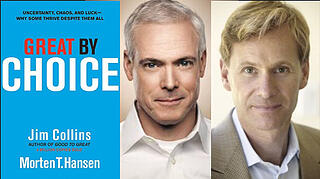Growth Insights for CEOs

AI Strategy for Financial Services CEOs: Why “Good Enough” is no Longer Enough
AI in financial services has moved from lofty claims about AI's use to being at the center of the growth conversation, shaping how you compete, run, and stay trusted. Margins are under pressure as customers benchmark you against their best digital experiences, whether they are opening a checking account, redeeming loyalty points, disputing a card charge, or seeking hardship help.
Recent Posts

Jim Collins' Great By Choice: SMaC Develops Your "Brand"
Tue, Jul 17, 2012 — What we can learn from Jim Collins' Great By Choice I’m a huge Jim Collins fan (and look forward to seeing him at the Global Leadership Summit Aug 9/10). But I will admit that I haven’t read all of his books cover to cover. You know, you pull a few cool ideas then lose interest once the nuggets have been revealed. That was until Jim Collins' “Great By Choice." I couldn’t put this one down and I couldn’t get enough. Perhaps it’s having the perspective from his prior findings, models and perspectives to build upon. But I found “Great By Choice” to be Jim’s best and most practical piece yet. In summary, I found that this wonderful book shares simple, actionable truths applicable to businesses of all sizes. Use SMaC to Develop Your Brand - Practices Can Last Decades Like many, I use a Kindle and enjoy highlighting and making notes as I go. Then I go back and review the “greatest hits” to be sure I’m activating the concepts I had hoped to retain. Having just done that, I was again taken by the SMaC (Specific, Methodical and Consistent) model and approach with this summary: “A solid SMaC recipe is the operating code for turning strategic concepts into reality, a set of practices more enduring than mere tactics. Tactics change from situation to situation, whereas SMaC practices can last for decades and apply across a wide range of circumstances.” - Jim Collins' “Great By Choice” Chapter 6 Struck by the phrase “practices can last for decades,” because it’s perhaps an unspoken truth that the 10X (winning) companies build their reputations (their brands) by executing consistently, over time. Collins’ references to company recipes and even the U.S. Constitution Articles that don’t change from year to year, but may evolve with highly considered amendments, is a reminder of knowing what you stand for. In our firm, we find this so important we’ve made it a centerpiece of our approach with clients, specifically our Purpose-Driven Marketing. With a business’ purpose in place – a purpose that reflects their knowledge of the marketplace – one can make plans, decisions and take actions with a consistency that other companies can’t.

#1 Way to Innovate: Execute
Thu, Jul 5, 2012 — As business leaders, we’re seduced into believing that innovation is the key to competitive advantage. How could anyone argue that an industry-changing product wouldn’t be a company’s ticket to leadership and success? Well, Jim Collins and Morten Hansen make a compelling and empirically-grounded counter argument in “Great By Choice”. Their 10X companies (those with substantially greater long term performance) are actually less innovative than their more innovative but less successful counterparts. Ultimately, it’s the company that “innovates” incrementally that is better prepared (and productively paranoid) that wins the day. The Cambridge Group has written fairly extensively on innovation. In their book “How Companies Win” Kash and Calhoun start with a compelling definition: “Innovation is finding unsatisfied profitable demand, then fulfilling it.” They go on to describe dimensions of Total Innovation: Invention New Product Innovation Product Enhancement Innovation Commercial (non-product) Innovation Operational Innovation Business Model Innovation
.png?width=1500&height=398&name=CO_Corporate%20Logo%202021_4C_HOR_FNL-1%20(1).png)